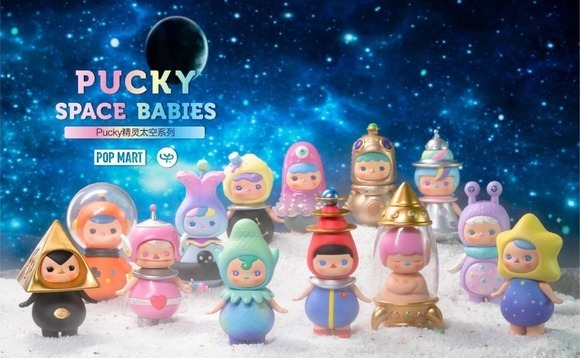
PE-backed Pop Mart posts strong gain after $674m HK IPO

Pop Mart International Group, China’s largest fashion toy retailer, gained 79% on its Hong Kong trading debut following a HK$5.22 billion ($674 million) IPO.
The company sold approximately 135.7 million shares for HK$38.50 apiece, representing the top end of the indicative range. The portion of the offering open to Hong Kong retail investors was 357 times oversubscribed, while the international portion was 44 times oversubscribed, according to a filing.
The stock opened at HK$80.25 on December 11 before falling back to close at HK$69.00. As of midday on December 14, it was trading at HK$64.50, giving the company a market capitalization of HK$89 billion ($11.7 billion). On delisting from the National Equities Exchange & Quotations (NEEQ) in April 2019, Pop Mart's market capitalization of RMB2 billion ($306 million).
Sequoia Capital holds a 4.39% stake in the company, having participated in a $100 million pre-IPO round through its global growth fund a matter of weeks before Pop Mart made its initial filing. That round was led by Loyal Valley Capital and Huaxing Growth Capital, which own 3.09% and 1.75%, respectively. Other investors include BA Capital and Vision Knight Capital.
Founded in 2010 as a supermarket for young people, Pop Mart started specializing in designer toys because these were its best-selling products. A key breakthrough came when the company teamed up with Hong Kong designer Kenny Wong and launched the enduringly popular Molly series of dolls. Wong inserted characteristics of traditional Chinese creatures into the classic Molly persona of a Western girl with golden hair and blue eyes. This led to an entire "Journey to the West"-style series.
The company operates under a blind box model: customers can buy a full set of 12 dolls for RMB708 ($100) or an individual doll without knowing which one. De Si, the company's co-founder, previously told AVCJ that the typical customer stays in the store for a long time, trying their luck by purchasing one blind box after another. There is a vibrant online community based on exchanging duplicates. Individual Pop Mart stores have their own WeChat groups as well to help fulfill the same purpose.
The company generated RMB1.68 billion in revenue last year, up from RMB514.5 million in 2018, while net profit rose from RMB99.5 million to RMB451.1 million, its prospectus shows. In the first six months of 2020, revenue reached RMB543.4 million and net profit came to RMB141.3 million.
Si told AVCJ that growth is not the result of high cash burn and high marketing expenditure: "We control our growth rate and our marketing cost is low. Moving too quickly can create problems in areas like customer service and supply chains." Advertising and marketing expenses were RMB53.8 million in 2019, which equates to 3.2% of revenue.
However, the company's net profit margin fell to 17.3% in the first six months of 2020 from 20.9% a year earlier, primarily due to rising distribution and sales expenses and the rollout of more retail stores and vending machines (known as roboshops).
Pop Mart regards intellectual property as its key competitive edge. The company claims the rights to 93 commercial concepts – 12 are proprietary and it has exclusive licenses to a further 25. Molly alone accounted for 27.1% of sales in 2019. The company is keen to accumulate more IP as part of its efforts to expand internationally.
Pop Mart had 136 stores across 33 Chinese cities as of June, plus 1,001 roboshops in 62 cities. Its wholesale channel comprises 25 distributors in China, and 22 in 21 overseas markets, including South Korea, Japan, Singapore, and the US. The company also sells online through Tmall, the Pop Draw mini-program via WeChat, and the Paqu pop toy community.
Sales transacted through directly owned stores accounted for 43.9% of revenue in 2019, down from 48.3% in 2018 and 63.9% in 2017. Online channels were responsible for 32% of sales, up from 20% and 9.4% in the two preceding years. In the first six months of 2020, online overtook retail stores, with 40.9% to 38.3%.
This was partly due to COVID-19, which led to the temporary closure of 88 stores in the first half. Consequently, same-store sales declined by 23.1% year-on-year.
Latest News
Asian GPs slow implementation of ESG policies - survey
Asia-based private equity firms are assigning more dedicated resources to environment, social, and governance (ESG) programmes, but policy changes have slowed in the past 12 months, in part due to concerns raised internally and by LPs, according to a...
Singapore fintech start-up LXA gets $10m seed round
New Enterprise Associates (NEA) has led a USD 10m seed round for Singapore’s LXA, a financial technology start-up launched by a former Asia senior executive at The Blackstone Group.
India's InCred announces $60m round, claims unicorn status
Indian non-bank lender InCred Financial Services said it has received INR 5bn (USD 60m) at a valuation of at least USD 1bn from unnamed investors including “a global private equity fund.”
Insight leads $50m round for Australia's Roller
Insight Partners has led a USD 50m round for Australia’s Roller, a venue management software provider specializing in family fun parks.








